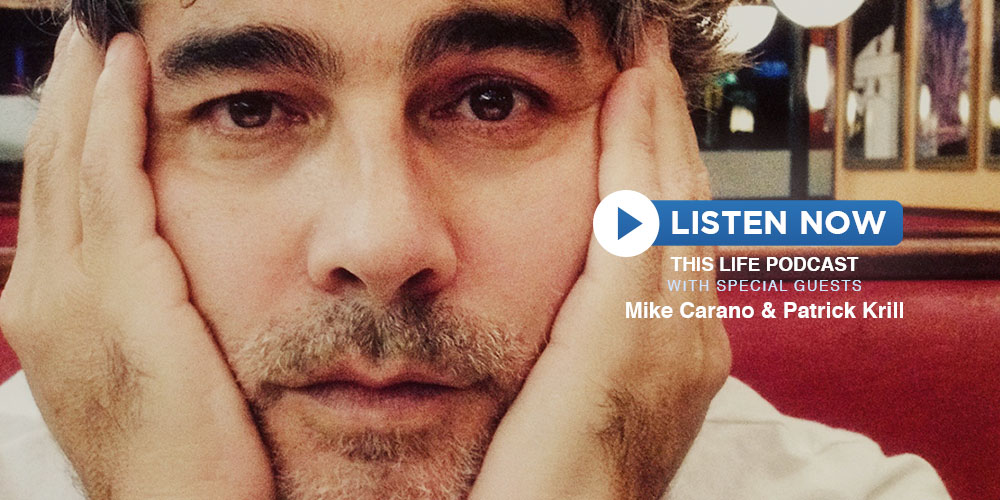
Mike Carano returns joining Patrick R. Krill, director of the Hazelden Betty Ford Foundation Legal Professionals Program. In this role, Patrick helps attorneys, judges and law students prepare for and overcome the distinctive challenges they face in recovery from chemical dependency.
Outro Music, “Roxy And Frank” by Mike Carano.
A new study indicates, based solely on volume and frequency of alcohol consumed, more than one in three practicing attorneys are problem drinkers. A national survey of approximately 15,000 attorneys (full release with details below), conducted by the American Bar Association (ABA) and the Hazelden Betty Ford Foundation, also found:
*21-percent of licensed, employed attorneys qualify as problem
drinkers
*28-percent struggle with some level of depression
*19-percent demonstrate symptoms of anxiety
*Younger attorneys in the first 10 years of practice exhibit
the highest incidence of these problems
ABA, Hazelden Betty Ford Foundation release first national study on
attorney substance use, mental health concerns
CHICAGO, Feb. 3, 2016 – A new, landmark study conducted by the
Hazelden Betty Ford Foundation and the American Bar Association
Commission on Lawyer Assistance Programs reveals substantial and
widespread levels of problem drinking and other behavioral health
problems in the U.S. legal profession.
Posted online this week in the _Journal of Addiction Medicine, _the
study reports that 21 percent of licensed, employed attorneys qualify
as problem drinkers, 28 percent struggle with some level of
depression and 19 percent demonstrate symptoms of anxiety. The study
found that younger attorneys in the first 10 years of practice exhibit
the highest incidence of these problems. The print edition of the
journal will be available in mid-February.
The findings of the national study, the most comprehensive ever,
represent a reversal of previous research that indicated rates of
problem drinking increased as individuals spent more time in the
legal profession. When focusing solely on the volume and frequency of
alcohol consumed, more than 1 in 3 practicing attorneys are problem
drinkers, the study found.
Attorney and clinician Patrick R. Krill, Hazelden’s architect of the
project and lead author of the study, said the findings are a call to
action.
“This long-overdue study clearly validates the widely held but
empirically undersupported view that our profession faces truly
significant challenges related to attorney well-being,” Krill said.
“Any way you look at it, this data is very alarming, and paints the
picture of an unsustainable professional culture that’s harming too
many people. Attorney impairment poses risks to the struggling
individuals themselves and to our communities, government, economy
and society. The stakes are too high for inaction.”
Linda Albert, a co-author of the study and representative of the ABA
Commission on Lawyer Assistance Programs, said there are countless
ways this data will benefit the profession. “While the numbers
themselves are disheartening, the instructive value of the
information is enormous and tells us that the problem is best
approached from a systems perspective. All sectors of the profession
will benefit from reading, understanding and utilizing this important
study, and now we can better develop strategies for preventing and
addressing substance use problems and mental health concerns in this
population.”
The study compared attorneys with other professionals, including
doctors, and determined that lawyers experience alcohol use disorders
at a far higher rate than other professional populations, as well as
mental health distress that is more significant. The study also found
that the most common barriers for attorneys to seek help were fear of
others finding out and general concerns about confidentiality.
“This new research demonstrates how the pressures felt by many
lawyers manifest in health risks,” ABA President Paulette Brown
said. “These ground-breaking findings provide an important guide as
the ABA commission works with lawyer assistance programs nationally
to address the mental health risks and needs of lawyers.”
The collaborative research project marks the first nationwide
attempt to capture such data about the legal profession.
Approximately 15,000 attorneys from 19 states and across all regions
of the country participated in the study.
THE HAZELDEN BETTY FORD FOUNDATION helps people reclaim their lives
from the disease of addiction. It is the nation’s largest nonprofit
treatment provider, with a legacy that began in 1949 and includes the
1982 founding of the Betty Ford Center. With 16 sites in California,
Minnesota, Oregon, Illinois, New York, Florida, Massachusetts,
Colorado and Texas, the Foundation offers prevention and recovery
solutions nationwide and across the entire continuum of care for
youth and adults. It includes a specialized program for legal
professionals, the largest recovery publishing house in the country, a
fully-accredited graduate school of addiction studies, an addiction
research center, an education arm for medical professionals and a
unique children’s program, and is the nation’s leader in advocacy
and policy for treatment and recovery. Learn more at
www.hazeldenbettyford.org.
Some of the links on this website are affiliate links, and as an Amazon Associate, we may earn an affiliate commission from qualifying purchases – at no cost to you.
This website is for informational and/or entertainment purposes only and is not a substitute for medical advice, diagnosis, or treatment.
© 2025 Drew Pinsky Inc. | All Rights Reserved
Get alerts from Dr. Drew about important guests, upcoming events, and when to call in to the show.
For text alerts, msg and data rates may apply